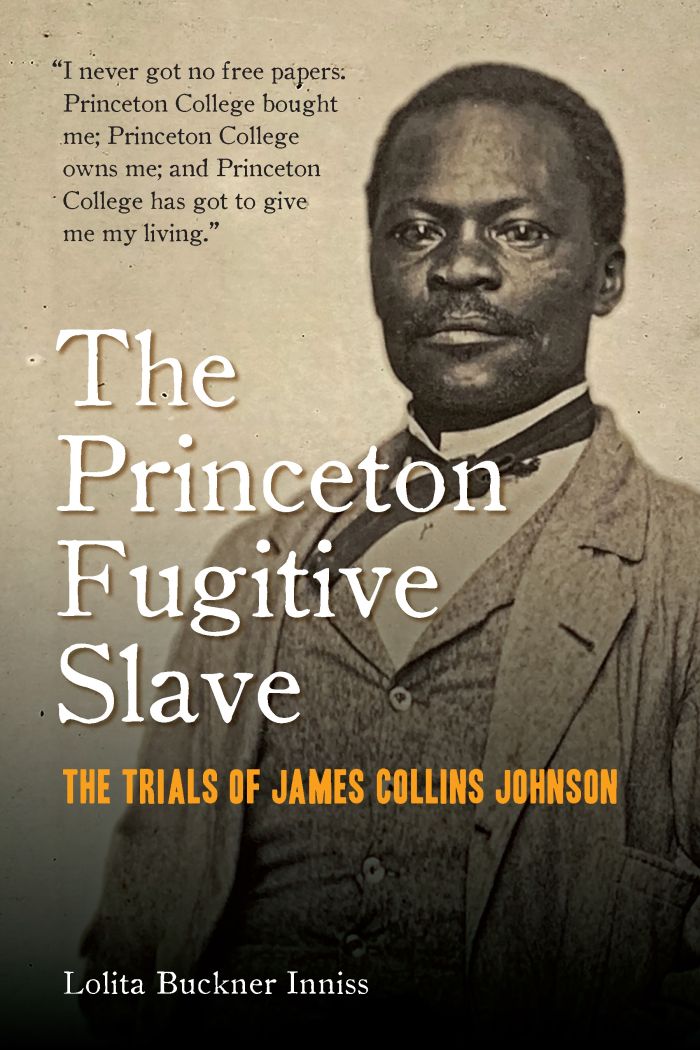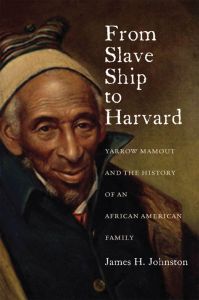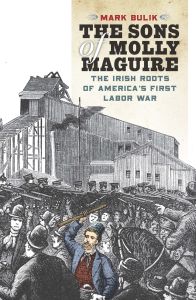The Princeton Fugitive Slave
The Trials of James Collins Johnson

This book can be opened with

WINNER, NEW JERSEY STUDIES ACADEMIC ALLIANCE BOOK AWARD
James Collins Johnson made his name by escaping slavery in Maryland and fleeing to Princeton, New Jersey, where he built a life in a bustling community of African Americans working at what is now Princeton University. After only four years, he was recognized by a student from Maryland, arrested, and subjected to a trial for extradition under the 1793 Fugitive Slave Act. On the eve of his rendition, after attempts to free Johnson by force had failed, a local aristocratic white woman purchased Johnson’s freedom, allowing him to avoid re-enslavement. The Princeton Fugitive Slave reconstructs James Collins Johnson’s life, from birth and enslaved life in Maryland to his daring escape, sensational trial for re-enslavement, and last-minute change of fortune, and through to the end of his life in Princeton, where he remained a figure of local fascination.
Stories of Johnson’s life in Princeton often describe him as a contented, jovial soul, beloved on campus and memorialized on his gravestone as “The Students Friend.” But these familiar accounts come from student writings and sentimental recollections in alumni reports—stories from elite, predominantly white, often southern sources whose relationships with Johnson were hopelessly distorted by differences in race and social standing. In interrogating these stories against archival records, newspaper accounts, courtroom narratives, photographs, and family histories, author Lolita Buckner Inniss builds a picture of Johnson on his own terms, piecing together the sparse evidence and disaggregating him from the other black vendors with whom he was sometimes confused.
By telling Johnson’s story and examining the relationship between antebellum Princeton’s black residents and the economic engine that supported their community, the book questions the distinction between employment and servitude that shrinks and threatens to disappear when an individual’s freedom is circumscribed by immobility, lack of opportunity, and contingency on local interpretations of a hotly contested body of law.
The Princeton Fugitive Slave is fascinating historical detective work. Lolita Buckner Inniss has recovered the journey of James Collins Johnson from his youth as a slave on the Maryland Eastern Shore to his life as a free man in Princeton. Deeply researched, the book overturns any lingering idea that Princeton was a haven from the broader society. Johnson had to cope with the casual racism of students, occasional eruptions of racial violence in town and the ubiquitous use of the N-word by even the supposedly educated. This book contributes to our understanding of slavery’s legacy today.—Shane White, author of Prince of Darkness: The Untold Story of Jeremiah G. Hamilton, Wall Street's First Black Millionaire
A rare story. James Collins Johnson was a legend among Princeton students, and Inniss provides enriching detail to explain what slave life was like, the difficulties of escape, the practical operation of the fugitive slave law, and why an owner would bother to seek a slave’s return four years after he left. Johnson’s saga is one example of the hurdles faced by fugitive slaves and of race relations in the 19th century in slave-holding Maryland and the free state of New Jersey.—James H. Johnston, author of From Slave Ship to Harvard: Yarrow Mamout and the History of an African American Family
Collectively, Inniss's work provides an exciting model for future scholars of slavery and labor. Perhaps most importantly, Inniss skillfully and compassionately restores Johnson's voice to his own historical narrative.—G. Patrick O'Brien, H-Slavery
Inniss has richly transformed Johnson's story from that of an escapee from a "kind slave master," saved by a white woman, and beloved by Princeton students as a sweet, jovial darling into a much more nuanced portrait of a human being. Her portrayal raised important questions about what it means to be free, and where the line lies between work and servitude. Most of all it is a lesson in the critical importance in listening to the narrative of each person.
[A] groundbreaking work of scholarship examining the relationship between the institutions of higher education and slavery. . . VERDICT Inniss presents a riveting legal review of a high-profile fugitive slave case. Whereas Johnson's story had previously been localized, this study is a welcome addition to all research, legal, and public libraries as an invaluable addition to this emergent field of studies.—John Muller, Library Journal
Through her dogged pursuit of Johnson’s story, Inniss presents a powerful understanding of Johnson’s life that unravels the dehumanizing narrative that persisted for generations of students on Princeton’s campus... [A]n important step towards creating a more truthful history of the relationships between black community members and institutions of higher education at the turn of the 20th century.
I never got no free papers. Princeton College bought me; Princeton College owns me; and Princeton College has got to give me my living.
Preface | vii
Timeline | xxiii
Introduction | 1
1 James Collins of Maryland, and His Escape from Slavery | 13
2 Princeton Slavery, Princeton Freedom | 37
3 The Betrayal and Arrest of James Collins Johnson | 57
4 The Fugitive Slave Trial of James Collins Johnson | 68
5 The Rescue of James Collins Johnson | 84
6 Johnson’s Princeton Life after the Trial | 100
Conclusion | 129
Acknowledgments | 133
Notes | 137
Bibliography | 205
Index | 229



